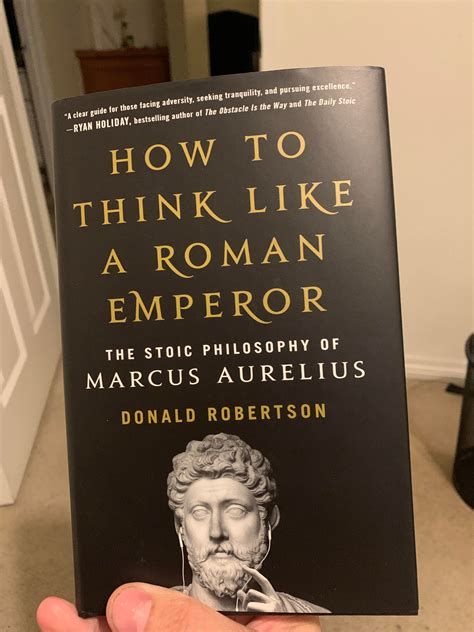"How to Think Like a Roman Emperor" by Donald J. Robertson delves into the life and philosophy of Marcus Aurelius, one of the most renowned Roman emperors and a practitioner of Stoicism.
Here are some key lessons from the book:
1. Practice Stoic Principles: Marcus Aurelius embodied Stoic philosophy, which emphasizes cultivating virtue, accepting what cannot be changed, and maintaining inner tranquility amidst external challenges. The book illustrates how Marcus applied these principles in governing the Roman Empire and facing personal struggles.
2. Embrace Adversity: Instead of resisting or lamenting hardships, Stoicism teaches embracing them as opportunities for growth. Marcus faced numerous trials during his reign, from wars to political intrigue, yet he approached them with equanimity and resilience.
3. Focus on What You Can Control: Stoicism advocates focusing on what lies within our control—our thoughts, actions, and attitudes—rather than fixating on external circumstances. Marcus Aurelius emphasized this in his writings, urging individuals to direct their energy towards virtuous behavior and moral improvement.
4. Maintain Perspective: Marcus Aurelius believed in viewing events from a broader perspective, recognizing the transience of life and the insignificance of many concerns. By adopting a cosmic perspective, he could better navigate the complexities of ruling an empire and confronting personal challenges.
5. Practice Self-Reflection: The book emphasizes the importance of introspection and self-awareness in Stoic philosophy. Marcus regularly engaged in journaling and self-reflection, using these practices to examine his thoughts, values, and behaviors, and to strive for self-improvement.
6. Cultivate Virtue: Stoicism places a strong emphasis on developing moral virtues such as wisdom, courage, justice, and temperance. Marcus Aurelius believed that true happiness and fulfillment stemmed from living in accordance with these virtues, rather than pursuing external rewards or pleasures.
7. Accept Impermanence: Stoicism teaches acceptance of the impermanence of all things, including life itself. Marcus Aurelius recognized the inevitability of death and the transient nature of earthly pursuits, leading him to prioritize virtue and the pursuit of wisdom.
8. Practice Gratitude: Despite the challenges he faced, Marcus Aurelius maintained a sense of gratitude for the blessings in his life. Stoicism teaches acknowledging and appreciating the things we have, rather than dwelling on what we lack or desire.
9. Lead with Virtue: As a leader, Marcus Aurelius sought to embody the virtues he espoused, leading with wisdom, justice, and humility. His example demonstrates the power of virtuous leadership in inspiring others and fostering a sense of unity and purpose.
10. Strive for Inner Peace: Ultimately, Stoicism aims for inner peace and tranquility, even in the midst of chaos and turmoil. Marcus Aurelius exemplified this ideal through his calm demeanor, philosophical resilience, and unwavering commitment to virtue.




